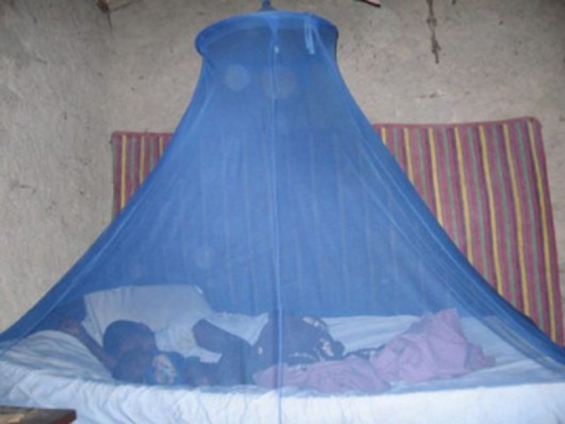Low usage of Long Lasting Insecticide Treated Bed Nets (LLITNs) identified in New Juaben South Municipality remain a grave challenge to Ghana’s drive in achieving zero malaria.
This is because many people in the Municipal capital, Koforidua, in the Eastern Region, though have access to the treated nets, fail to use them due to social myths and perceptions.
Some claimed they had no space to hang the nets because of their large family sizes, while others said it was uncomfortable sleeping under it as it produced heat.
This came to light in a survey conducted by Ghana News Agency between January and February 2021 in over 12 communities within the Municipality.
The survey sought to establish weather people were using the insecticides bed nets as a form of personal protection to reduce malaria illness, severe disease, and death due to malaria.
In community-wide trials in several African settings, ITNs were shown to reduce the death of children under five years from all causes by about 20 percent.
The survey was part of the National Media Malaria campaign in collaboration with the African Media Malaria Research Network (AMMREN) and the National Malaria Control Programme (NMCP).
Some of the communities surveyed included; Srodae, Betom, Nsukwao, Zongo, Nyamekrom, Densuano, Debrakrom, Apenkwa, Aberewa Nkwanta and Central Business District in the New Juaben South Municipality.
The survey established that almost every household had access to two or more LLITNs distributed freely, mostly through their children in school.
The delivery was done during Child Welfare and Ante-natal clinics and other mass point of distribution programmes by the Ghana Health Service (GHS) in line with planned strategies to reduce malaria burden in communities countrywide.
Madam Aku Doe, a mother of three, said she had about four bed nets during antenatal clinics, while two were given through her children at school.
However, she said she was not using them “due to the heat it generates,” adding, getting space to hang them posed a challenge.
She has therefore opted to burn mosquito coils, as another control measure, to knock down the leeches.
Another mother of four, Madam Rose Doryoe, also said she had two-bed nets but had also chosen to be burning coils orange peels to ward-off mosquitoes.
Madam Rose said she had to burn coils and peels because she slept on floor with her family and also didn’t know how to fix the nets.
A 40-year-old teacher, Mr Charles Derke, with his children said he felt like “sleeping in a coffin” anytime he slept under bed nets. Though, he had more than three pieces of bed nets given to him by GHS, he only used one
sometime ago and had not tried it for his children.
Malaria remains one of the top diseases recorded at Out-Patients-Department in health facilities in the Municipality. In 2018, a total of 37,736 confirmed cases of malaria were recorded.
Reverend Richard Yeboah, Eastern Regional Focal Person for Malaria, said sleeping under treated bed nets was one of the surest ways to prevent malaria.
The public was encouraged to use bed nets to protect them against malaria bites and its transmission. Rev Yeboah also explained that LITNs last three years, hence the rationale behind the mass distribution every three years to ensure every household had access to new ones to replace the old.
He appealed to the public to use the nets for their own safety, and dispelled the popular notion that malaria was not only transmitted by the bite of an infected anopheles mosquito, but through fatigue, walking in sunshine and doing hard work.
He stressed that the NMCP treated bed nets were widely distributed through several means under the mass distribution exercise, which included; schools, health facilities and mass distribution points in communities.
However, he said it was regrettable some people were accosted for using the treated nets for different purposes. In view of the low utilization of bed nets, he said plans were advanced to intensify education in various communities on the need to sleep under treated nets.
He announced that a three-year period of mass distribution of treated insecticides bed nets would be rolled out soon.
Latest Stories
-
Ghana-Russia Centre supports pupils of Pakro-Zongo basic school
46 minutes -
Ghana launches Malaria Youth Corps, leveraging youth power in fighting malaria
2 hours -
Book Review – All’s Well (Feehi): Living a Life Guided by Grace by Abednego Okoe Feehi Amartey and Theodora Dame Adjin-Tettey
3 hours -
French for health: A new initiative by French Embassy in Ghana
9 hours -
Ghana slowly retracing steps back to path of macroeconomic stability – Deloitte
9 hours -
Ghana’s debt service-to-revenue ratio reached all-time high of 127% in 2020, highest in SSA – IMF
9 hours -
Ghana’s consolidation efforts under IMF progamme to continue to be based on revenue
9 hours -
GPL 2024/25: Hearts beat 3-1 Chelsea to return to winning ways
10 hours -
Ghana set to host second Flag All-Star Game in Accra
11 hours -
Angor CREMA: Empowering Ghana’s coastal communities for sustainable growth
11 hours -
The Legon VC… and childhood memories
12 hours -
The absurd inequality of climate work: Overcoming dilemmas in the green transition
13 hours -
ORAL team receives first dossier of ¢500m National Service ghost names scandal
13 hours -
AfroFuture’s Culture Beach Jam comes off Dec. 28 & 29
13 hours -
NDC gov’t to address first quarter expenditure after January 7 – Ato Forson to Ghanaians
13 hours

